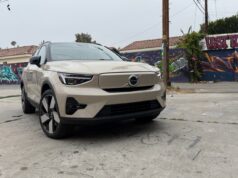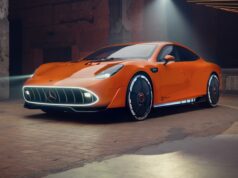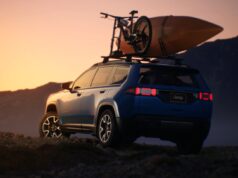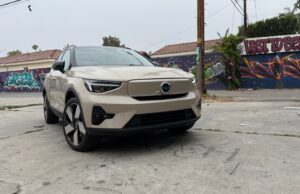
VW has released a new set of photos of the 2011 Phaeton.
The new Phaeton gets a new face that is similar to that of the rest of the new VW lineup. The front end now has standard bi-xenon headlights with LED cornering lights. It’s offered with two wheelbases and two different rear seat options (three seat bench or two individual seats).
A new optional front camera actually reads traffic and speed limit signs and displays them in the instrument cluster. The Phaeton will be available with V6, V8 and W12 engines when it becomes available in Europe in June and China in August.
Related Stories:
2011 VW Passat Photo Leaked Ahead of Paris Debut
2011 VW Polo Sedan Unveiled in Russia
2011 VW Phaeton Tries to Move VW Up-Market…Again
PRESS RELEASE:
To the point: The new Phaeton – One of the world’s highest quality saloons got even better
Flagship of the Volkswagen brand has fundamentally new front-end styling
Online services and dynamic main beam control make their way into Phaeton
Wolfsburg / Sanya, 05 June 2010 – Volkswagen produces one of the world’s highest quality and most exclusive automobiles at the German Transparent Factory (Dresden): the Phaeton. The quality, style and travelling comfort of this saloon (standard all-wheel drive, air suspension and 4-zone automatic climate control) set their own standards. The Phaeton is offered with two wheelbases as well as two rear seating versions (three seat bench or two individual seats). Now Volkswagen has further perfected the brand’s flagship.
The entire front end was redesigned, including the standard bi-xenon headlights with LED cornering lights. Also tuned to match this look are the new LED rear lights. In parallel, an abundance of new technical features are making their way into the vehicle. They include a new brake system, the Dynamic Light Assist (camera-based, dynamic main beam control) system being introduced in a saloon for the first time, and a navigation system, which can integrate online data in the map display upon request. Moreover, thanks to an optional front camera the Phaeton “sees” traffic signs; speed limit signs are visualized in the instrument cluster (multifunction display) and the central touchscreen of the centre console. The system will be the first in the world to recognize and display no-passing zone markings. The latest generation of the Phaeton will launch on the market in just a few weeks (Europe in June; China in August).
V6, V8 and W12 engines: On the drive side, four engines are available (one turbodiesel, three petrol). The six, eight and twelve cylinder engines cover a power range extending from 176 kW / 240 PS to 331 kW / 450 PS. The six-cylinder petrol engine in the Phaeton is a V6 direct-injection engine (FSI with 206 kW / 280 PS). At the power levels above the V6 FSI, a V8 and a W12 petrol engine are available (246 kW / 335 PS and 331 kW / 450 PS). In the diesel area, Volkswagen offers an extremely fuel efficient and refined V6 TDI (174 kW / 240 PS) whose combined fuel consumption has been reduced from 9.0 to 8.5 l/100 km (equivalent to 224 g/km CO2).
Design avant-garde: The Volkswagen Design-DNA developed by the Head of Design for the Group, Walter de Silva, defines the car’s lines. In the area of the new front end, in particular, the design team added a measure of precision to the original, stylish and superlative image of this model. This gave the timelessly elegant Phaeton a broader and more powerful appearance: In keeping with the current Volkswagen Design-DNA, horizontal lines dominate the geometry. Different than on any other Volkswagen based on this new DNA so far, in the Phaeton the radiator grille is not styled in glossy black; rather a completely new chrome element is used. This radiator trim has a decisive impact on the styling of the new Phaeton.
Joining the left and right sides of the grille are the newly developed bi-xenon headlights with integrated LED indicator lights and LED cornering lights. The new bumper design complements the radiator grille and headlight styling. Here too, horizontal lines are the virtual common thread linking their design. Even the front fog lights now shine in LED technology. The rear section of the car was also modified. In this area, the design team chose not to change the classic, clear and powerful basic styling of the Phaeton; instead it developed new smoked LED rear lights. Similar to the front end, the rear bumper was also modified. In its side profile, the car’s new side trim strips and narrow-styled LED indicator lights in the outside mirrors stand out.
Interior artistry: The interior of the Phaeton is one of the most elegant, high quality and comfortable of the entire luxury class. The styling is linear and timeless; the materials and quality of workmanship define the benchmark worldwide. Unmatched in quality are its technological concepts such as a draft-free 4-zone climate control system and 18-way seats with award-winning ergonomics. As an alternative to the version with three rear seats (5-seater), the saloon may be ordered with two electrically adjustable individual seats as an option (4-seater). The Phaeton is also available in an extended chauffeur version that is 120 millimetres longer. The possibilities for customising the saloon are practically limitless with numerous options from Volkswagen Exclusive covering a broad range of leather, Alcantara trim, wood accents and such features as a refrigerator and multimedia systems. This also applies to the new styling of the multifunction steering wheel; it can be ordered in either leather or a wood-leather combination that is coordinated with the interior accents. Many customers in Europe – and those customers travelling to Europe – take advantage of the opportunity to configure their new Phaeton with original leathers, woods and paints right at the Transparent Factory.
Infotainment systems: The thoroughly intuitive operation of the Phaeton was transferred unreservedly to the current generation radio/navigation system (RCD 810 as standard unit and RNS 810 as an option). The systems, whose features include 8-inch touchscreen control, form one functional unit with the climate control and multimedia controls. In the new Phaeton, Volkswagen is offering – for the first time – an Internet-based Google function as a supplement to the map display of the RNS 810 radio-navigation system with 30 Gigabyte hard drive. The relevant data are loaded into the system via mobile telephone using a specially set up Proxy Server. Visualisation on the touchscreen display is the same as that of the Google maps “Satellite” view or the Google “Hybrid” map on the iPhone, which are familiar from the conventional Internet, and it includes Points of Interest that can be called up. In the Phaeton, the satellite images are of course supplemented by the selected route recommended by the navigation system.
Ideally, the system loads the data over a UMTS connection. The telephone itself is fully integrated in the system via remote SIM Access Profile (rSAP). If a user wants to use a mobile phone with Hands-Free Profile (HFP) as an alternative (e.g. the iPhone), this is also possible in the new Phaeton (in this case, Google is not activated). The infotainment system can do even more. Thanks to an optional camera, it can now recognise traffic signs and show the relevant information on the touchscreen and/or the display of the multifunction display (located between the speedometer and tachometer). By the way, this is the first vehicle in the world to indicate no-passing zones to the driver.
Electronic assistance systems: Assistance systems on the Phaeton include the new Dynamic Light Assist (dynamic main beam control), ACC (adaptive cruise control), Front Assist (surroundings monitoring system) and Side Assist (lane-changing assistant) systems. A tyre pressure monitoring system contributes to an even higher standard of safety. A completely new development is the optional Dynamic Light Assist: In conjunction with a camera integrated behind the front windscreen, the main beam modules of the bi-xenon headlights remain continually active; they are only masked in areas in which the system has analysed potential glare to other traffic participants. As a result, the driver has considerably more light to work with, and the system offers a clear gain in safety and driving convenience.























